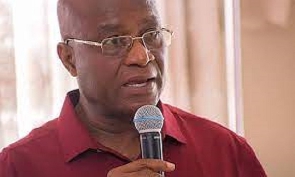 Osei Kyei-Mensah-Bonsu, the Majority Leader and Leader
Osei Kyei-Mensah-Bonsu, the Majority Leader and Leader
Osei Kyei-Mensah-Bonsu, the Minister for Parliamentary Affairs, has called for the enactment into law of the proposed Property Rights of Spouses Bill.
He explained that the passage of the Bill would direct the distribution of spousal property among spouses going through a divorce or separation.
Kyei-Mensah-Bonsu, also the Majority Leader and Leader of Government Business of Parliament made the call in Accra at the Ministry of Parliamentary Affairs engagement with the core leadership of Parliament dubbed: “Revisiting the Property Rights of Spouses Bill.”
The day’s engagement had the objective of seeking the commitment of the leadership of Parliament to support processes that would lead to the re-laying of the Bill before the House in the next session.
Participants included the leadership of Parliament and the members of the Queen Mothers Association in Ghana.
Players discussed the challenges hampering the passage of the Bill and strengthened institutional collaborations for it.
The Property Rights of Spouses Bill, 2009, was introduced in Parliament by the Ministry of Justice. However, Parliament was unable to pass the Bill as envisaged.
The objective of the Bill when passed would address the plethora of issues divorcees and those in widowhood, especially women, faced in terms of sharing or distribution of property.
Research suggested that the Bill contained many useful provisions, such as who qualifies as a ‘spouse’; the concept of cohabitation; the introduction of marital property agreements (also known as prenuptial agreements in some jurisdictions), and the need for a spouse to obtain the other’s consent before entering any transaction that relates to joint property of the spouses.
Kyei-Mensah-Bonsu, also the New Patriotic Party Member of Parliament (MP) for Suame, in his address, emphasised that the Constitution, in Article 22(2), enjoined Parliament to ensure that spousal property rights were protected, a reason lawmakers ought to promise to fulfil the dictates of Article 22(2) to actualise the passage of the bill “as soon as practicable.”
“…It appears the blame for non-passage of the Property Rights of Spouses Bill has been rightly laid on the doorstep of Parliament because the bill has been laid twice, referred to the committee and allowed to lapse,” he said.
Article 229(1) states that “A spouse shall not be deprived of a reasonable provision out of the estate of a spouse whether or not the spouse died having made a will.
And 22(2) says “Parliament shall, as soon as practicable after the coming into force of this Constitution, enact legislation regulating the property rights of spouses.”
Kyei-Mensah-Bonsu expressed worry over how in the absence of such a law, the courts and judicial activists had gone ahead to pass some judgements which had become guidelines for the distribution of property acquired during the subsistence of a marriage upon dissolution.
“The current measures in use by the courts are only focused on parties in monogamous marriages, leaving out those in the polygamous setting. In all of this, there is no certainty and as such the law is needed to ensure that equity prevails,” the Suame legislator said.
He recalled that it had been 30 years since the 1992 Constitution came into effect, adding “It took 16 years to present the first draft Property Rights of Spouses Bill to Parliament and another seven years to consider the bill.”
According to Kyei-Mensah-Bonsu, about 8,366,466 Ghanaians were married per the 2021 Housing and Population Census and over 950,000 marriages in Ghana were currently divorced or the couples were separated.
He gave the breakdown that while 553,065 marriages dissolved, 405,090 had separated, “these are just the official figures,” he added.
“Out of the almost 8.4 million married Ghanaians, 6,748,622 of them have not registered their marriages, with only 1,617,844 registered,” he said.
He therefore said the passage of the Land Act 2020 should be celebrated by supporters of the bill for the commendable depth of the provisions on the Spousal Rights to Property.
However, he said it was simply not enough and could not replace the urgent need for a fully-fledged Property Rights of Spouses Law.
“My study of the two draft bills that were presented to Parliament in 2009 and 2013 but failed to pass shows that they contained germane and beneficial provisions,” he said.
Alhaji Mohammed Mubarak Muntaka, a National Democratic Congress MP for Asawase, condemned the differences in cultures, ethnic, marriages and religious backgrounds of the Ghanaian society for being a major limitation to the passage of the bill.
He, therefore, advocated for the urgent need for a second look at the bill to incorporate all the differences in society to facilitate the passage of the bill.
He said: “We need to have a bill that will be able to, for example, regulate marriages because of the way we are intermarrying.”
“But if you want to assume that we want to do it one size fits all, the bill will continue to have the kinds of challenges it is facing,” he said.
On her part, Nana Otubea, the President of the Queen Mothers Association in Ghana, expressed worry at how in specific areas in the country women were often “packed out” of their matrimonial homes when their husbands passed away.
She, therefore, urged Parliament to expedite the passage of the Property Rights of Spouses Bill to protect the rights of women in marriages.